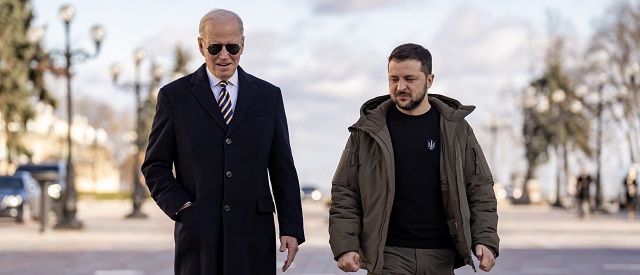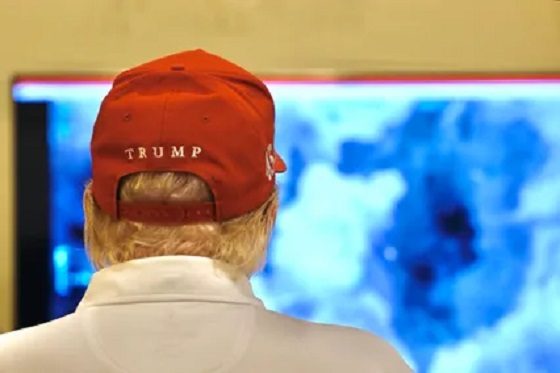conflict
With Only Months Left In Term, Biden Is Starting To Run Out Of Options In Russia-Ukraine War

 From the Daily Caller News Foundation
From the Daily Caller News Foundation
By Jake Smith
As the clock ticks down to January — the end of President Joe Biden’s sole term — the Biden-Harris administration is trying to figure out how to aid Ukraine against Russia with limited and dwindling options.
The Russia-Ukraine war has dragged on for more than two years, and though the Biden administration has devoted over $175 billion in economic and military aid to help Ukraine, it has done little to shift the tides in Kyiv’s favor. The Biden administration, unlikely to receive any more funding for aid from Congress, is looking at alternative choices including loosening weapons restrictions and allowing Ukraine to strike further inside of Russia, The Wall Street Journal reported.
The new policy would only apply to European and other Western weapons, not U.S. systems, according to multiple reports. Secretary of State Antony Blinken hinted on Wednesday that such a move was on the table and strongly being considered.
Lifting the restrictions would represent a major shift in approach from the Biden administration, which has been wary of allowing Ukraine to use Western-provided weapons for deep strikes inside Russia up to this point.
But Ukraine is likely to want more from the Biden administration than being allowed to use European weapons for long-range strikes. Specifically, Ukraine wants to use American-made Army Tactical Missile Systems (ATACMS) to strike Russia, given the high quality and range of the system, though the administration may be more unlikely to grant that request.
Besides loosening weapons restrictions, the administration has few other options. Though Biden was able to sign off on a congressionally approved $60 billion aid package for Ukraine in April, Congress isn’t expected to grant any more funding for the war between now and January, limiting the amount of assistance the administration can provide.
The Russia-Ukraine war has largely stalled out, with neither side conceding substantial territory to the other, although Ukrainian forces have recently made a surprising incursion into southern Russia and captured hundreds of miles of territory.
“They see this as part of their strategy to defend themselves, to develop leverage,” the senior administration told the WSJ.
Behind closed doors, however, administration officials are worried that Ukraine is dedicating too many forces to the incursion and stretching thin its forces trying to hold the front line against Russia, according to the WSJ. Russian forces have also begun a counteroffensive against Ukrainians spearheading an incursion, risking further escalation in the war.
Biden’s top aides realize the odds that Ukraine can secure a military victory against Russia by January are near zero, according to the WSJ. The Biden administration is not pressuring Kyiv to negotiate a peace deal with Russia, even though some lawmakers and national security experts believe that is the only way to end the war.
Instead, the administration is choosing to let Kyiv dictate war plans and “improve Ukraine’s strategic position to the greatest extent possible between now and the end of the term,” one senior administration official, speaking on condition of anonymity given the sensitive nature of the matter, told the WSJ.
The Biden administration has been under scrutiny for its handling of the Russia-Ukraine war, with critics fearing that there is no strategy to end the war or push Ukraine toward a military victory, which itself seems unlikely. The U.S. has slowly become more involved in the war but it has done little to move the needle while Ukraine’s manpower continues to be exhausted.
The administration’s strategy “sounds an awful lot like a recipe for another endless war [because it is] unable to send enough weapons to make a decisive difference on the battlefield, and they don’t have a clear sense of what the endgame should be,” Rachel Rizzo, senior fellow at the Atlantic Council, told the WSJ.
conflict
Zelensky Alleges Chinese Nationals Fighting for Russia, Calls for Global Response

 Sam Cooper
Sam Cooper
Ukrainian President Volodymyr Zelensky announced Tuesday that his forces have captured two Chinese citizens fighting as part of the Russian army in eastern Ukraine, alleging “there are many more Chinese citizens in the occupier’s units.” The stunning revelation could inject a volatile new dimension into ceasefire negotiations between the United States and Russia—and intensify already fraught tensions over Taiwan.
Zelensky shared the news in an X post, accompanied by video of one of the captured men—an Asian male in beige fatigues, hands bound with zip ties, visibly distressed as he gestures to a Ukrainian camera operator. The video shows the man making whirring sounds, crouching instinctively as if a drone is circling above and opening fire—then glancing up and uttering the English word, “commander.”
“We have information suggesting that there are many more Chinese citizens in the occupier’s units than just these two,” Zelensky wrote on X. “We are currently verifying all the facts—intelligence, the Security Service of Ukraine, and the relevant units of the Armed Forces are working on it.”
The president said he has instructed Ukraine’s foreign minister to urgently contact Beijing to clarify how China intends to respond.
“Russia’s involvement of China, along with other countries, whether directly or indirectly, in this war in Europe is a clear signal that Putin intends to do anything but end the war,” Zelensky wrote. “He is looking for ways to continue fighting. This definitely requires a response. A response from the United States, Europe, and all those around the world who want peace.”
Zelensky added that Ukrainian authorities had recovered documents, bank cards, and personal data from the two prisoners—material that could be pivotal in discovering the nature of China’s involvement.
If verified, the presence of Chinese nationals fighting for Russia could carry sweeping geopolitical implications. It would complicate delicate U.S.-Russia negotiations aimed at exploring a conditional ceasefire, and could have indirect ramifications on the plans of Washington, Tokyo, and Taipei in their growing confrontation with Beijing.
China has repeatedly denied providing direct military support to Russia. Zelensky’s statement marks the first time Ukraine has publicly alleged that Chinese nationals are embedded in Russian combat units—an allegation that, if substantiated, could alter the strategic calculus in both Eastern Europe and the Indo-Pacific.
Responding to Zelensky’s claims, Tom Shugart, a senior defense analyst at the Center for a New American Security and a former U.S. Navy officer, emphasized that the strategic implications hinge on whether the Chinese nationals were acting as mercenaries or state-directed personnel. “If the PRC is actively providing soldiers to fight in Ukraine, that would be altogether different—a possible sign of a real Axis that may best be resisted wherever it is fighting,” he wrote on X.
This is a developing story. The Bureau will continue to report as further details emerge.

Recommend The Bureau to your readers
conflict
“HELL WILL RAIN DOWN”: Trump unleashes U.S. military on Yemeni Houthis

 MxM News
MxM News
Quick Hit:
President Trump ordered a massive military assault on Iranian-backed Houthi forces in Yemen on Saturday, vowing to unleash “overwhelming lethal force” after months of attacks on American and allied vessels in the Red Sea.
Key Details:
-
Trump announced the strikes in a Truth Social post, stating, “Today, I have ordered the United States Military to launch decisive and powerful Military action against the Houthi terrorists in Yemen.”
-
He criticized former President Joe Biden for failing to contain the Houthis, saying his response was “pathetically weak” and emboldened the group’s ongoing attacks on commercial and military vessels.
-
The U.S. Navy’s USS Harry S. Truman carrier strike group, along with three destroyers and a cruiser, launched the assault, targeting radars, air defenses, and missile systems used to disrupt shipping lanes.
CENTCOM Forces Launch Large Scale Operation Against Iran-Backed Houthis in Yemen
On March 15, U.S. Central Command initiated a series of operations consisting of precision strikes against Iran-backed Houthi targets across Yemen to defend American interests, deter enemies, and… pic.twitter.com/u5yx8WneoG
— U.S. Central Command (@CENTCOM) March 15, 2025
Diving Deeper:
President Trump escalated U.S. military action against Iran-backed Houthi rebels on Saturday, ordering airstrikes on targets in Yemen in response to the group’s repeated attacks on Red Sea shipping. Trump, in a Truth Social post, declared that the U.S. military would not tolerate continued aggression and vowed an overwhelming response.
“The Houthi attack on American vessels will not be tolerated,” Trump wrote. “We will use overwhelming lethal force until we have achieved our objective.” He directly warned the Houthis, stating, “YOUR TIME IS UP, AND YOUR ATTACKS MUST STOP, STARTING TODAY. IF THEY DON’T, HELL WILL RAIN DOWN UPON YOU LIKE NOTHING YOU HAVE EVER SEEN BEFORE!”
The strikes, carried out by U.S. Central Command, targeted missile sites, drone launch facilities, and command centers used by the Houthis to strike commercial and military vessels in the Red Sea. U.S. warships and carrier-based fighter jets participated in the mission, marking a significant escalation in efforts to protect international shipping routes.
Trump also issued a direct warning to Iran, demanding that its support for the Houthis “must end immediately.” Addressing Tehran, Trump wrote, “Do NOT threaten the American People, their President…or Worldwide shipping lanes. If you do, BEWARE, because America will hold you fully accountable and we won’t be nice about it!”
The strikes come after more than a year of escalating attacks by the Houthis, who have targeted over 100 merchant vessels, sunk at least two, and killed multiple sailors since the Israel-Hamas war began. Trump pointed to Biden’s failures in handling the crisis, noting that “it has been over a year since a U.S.-flagged commercial ship safely sailed through the Suez Canal, the Red Sea, or the Gulf of Aden.”
With Trump’s order, the U.S. is making clear that hostile actions in the Red Sea will not go unanswered. As military operations continue, all eyes will be on whether the Houthis and their Iranian backers heed the warning—or face even greater firepower from the U.S. military.
-

 Daily Caller1 day ago
Daily Caller1 day agoTrump Executive Orders ensure ‘Beautiful Clean’ Affordable Coal will continue to bolster US energy grid
-

 2025 Federal Election1 day ago
2025 Federal Election1 day agoBREAKING from THE BUREAU: Pro-Beijing Group That Pushed Erin O’Toole’s Exit Warns Chinese Canadians to “Vote Carefully”
-

 Business1 day ago
Business1 day agoChina, Mexico, Canada Flagged in $1.4 Billion Fentanyl Trade by U.S. Financial Watchdog
-

 COVID-1922 hours ago
COVID-1922 hours agoTamara Lich and Chris Barber trial update: The Longest Mischief Trial of All Time continues..
-

 2025 Federal Election2 days ago
2025 Federal Election2 days agoTucker Carlson Interviews Maxime Bernier: Trump’s Tariffs, Mass Immigration, and the Oncoming Canadian Revolution
-

 2025 Federal Election1 day ago
2025 Federal Election1 day agoAllegations of ethical misconduct by the Prime Minister and Government of Canada during the current federal election campaign
-

 Energy24 hours ago
Energy24 hours agoStraits of Mackinac Tunnel for Line 5 Pipeline to get “accelerated review”: US Army Corps of Engineers
-

 Business2 days ago
Business2 days agoDOGE Is Ending The ‘Eternal Life’ Of Government







